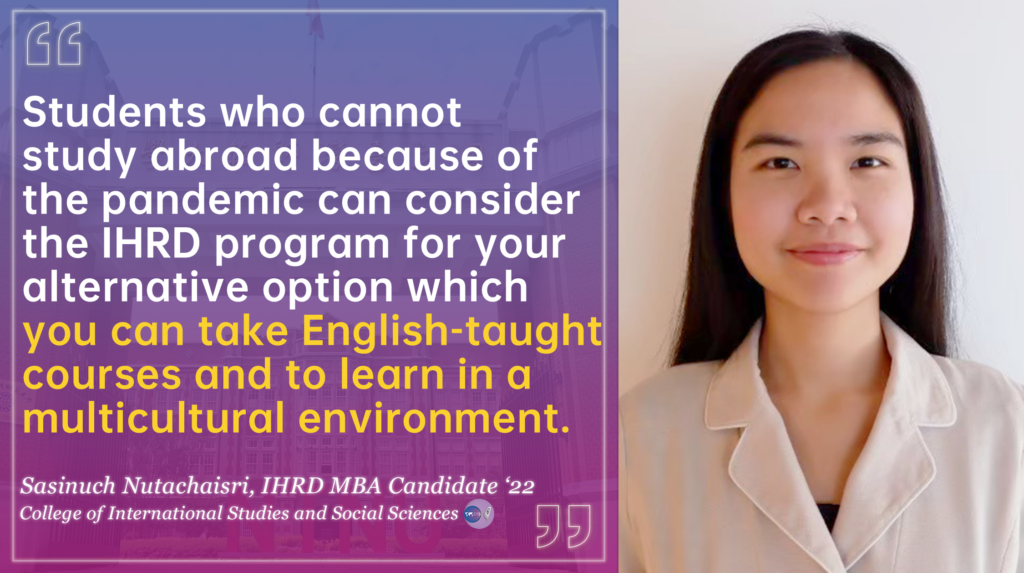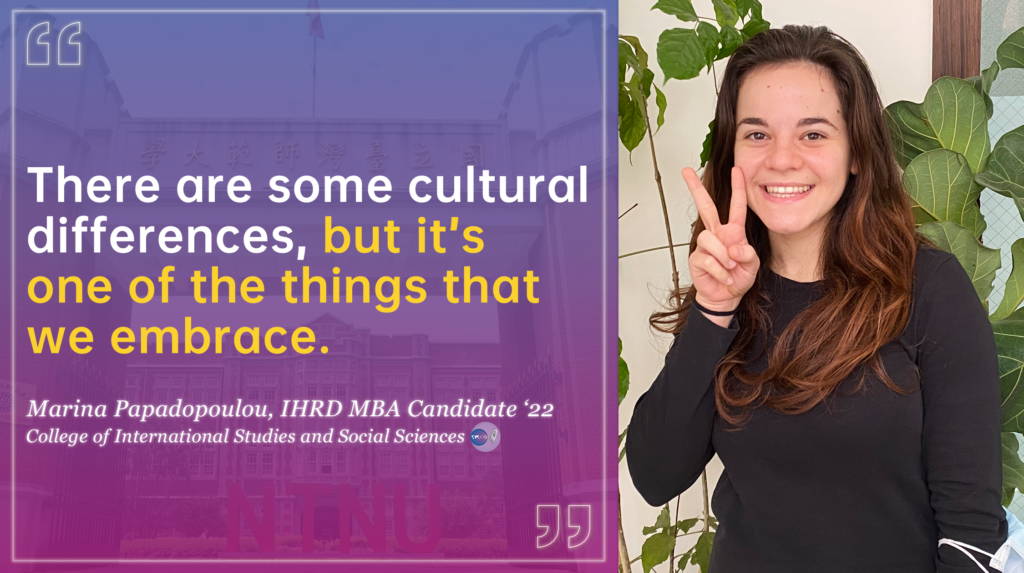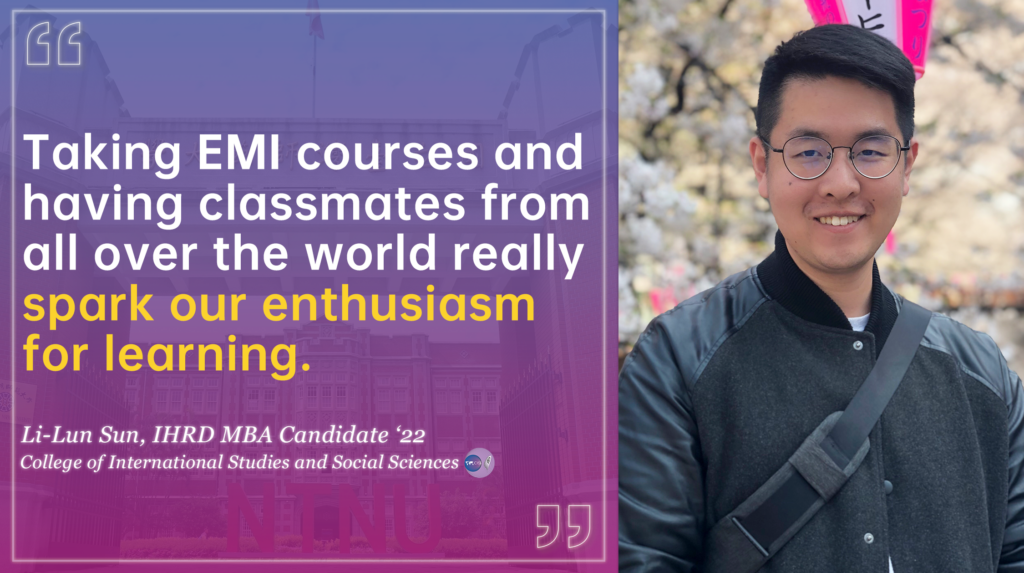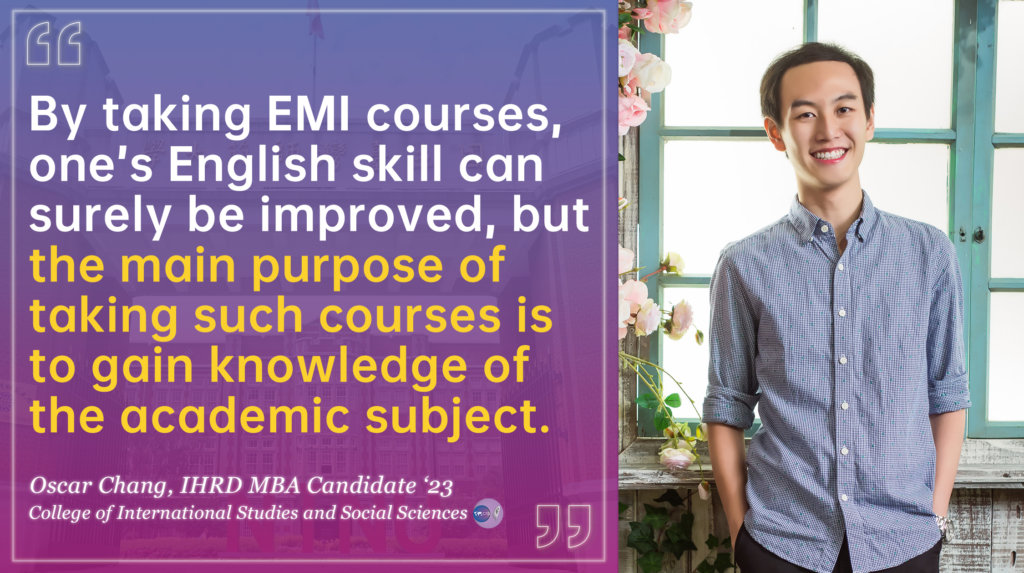| EMI Courses —— Students' View
Get Your Ticket to Explore the World: NTNU IHRD’s English-Taught Master’s Program Attracts Local and International Students
Log on to the National Taiwan Normal University (NTNU) course registration website and click the “English-taught courses”, what you will get are more than 600 courses for the Spring 2022 semester. Among all NTNU programs, the Graduate Institute of International Human Resource Development (IHRD)is one of the programs that provides students with the greatest number of English-taught courses: up to 14 English-medium instruction (EMI) courses are offered in Spring 2022.
IHRD, widely known as the first postgraduate institute in Taiwan to offer an English-taught MBA program that has a reserved quota for international applicants, will be celebrating its 20th anniversary this October. Each year, IHRD seeks to enroll a full-time class of about 30 students (half local, half international students).
Currently, the student body of IHRD is comprised of students from more than 13 countries, including the U.S.A, Belgium, Malaysia, Thailand, Honduras, and Turkey to name a few. “Even those who are studying overseas are unlikely to meet peers from such diverse backgrounds in one classroom like us.” said Dr. Yi-Chun Lin, the Director of IHRD.
So, what exactly is the appeal of IHRD? Why do international students spend two or more years pursuing a degree in an unfamiliar country? And why do Taiwanese students choose to study an English-taught program in IHRD instead of learning HR related topics in Mandarin? In this article, we asked four current students about their experiences attending IHRD and their thoughts on the EMI courses provided by the program.
Sasinuch Nutachaisri (Sunny)|Thailand|MBA Candidate ‘22

Sasinuch Nutachaisri, more commonly known as Sunny, is a second-year student of IHRD from Thailand. After working in the HR consultant field, Sunny decided to pursue further studies in the HR field and that was when she found IHRD which offers English taught courses.
“The language barrier becomes a small challenge that I can overcome with support from the school and my friends, as the IHRD curriculum is taught entirely in English and also surrounded with an international-friendly atmosphere. At the same time, NTNU provides international students who would like to ground basis and improve mandarin skills with free Chinese classes and the Mandarin Tutorial Service, which sort of help me adapt to my life in Taiwan,” said Sunny, who considered joining IHRD as one of the best decisions she has ever made because of the multicultural learning environment provided by the program. “Because of Covid, I haven’t been home for nearly two years, but I think it’s totally worth it. Studying in IHRD offers me the chance to make friends with people from diverse backgrounds.”
As IHRD focuses on teaching practical skills alongside theories, students get to learn by doing, said Sunny. In the course “Studies in E-HR (E-human Resource)”, they visited companies to gain real-world experiences in HR. “We visit their workspace, we see the real case… and yes, the employees all speak in English.” said Sunny excitedly.
Studying away from home in IHRD is a rewarding experience for Sunny. She encouraged other non-native English speakers to step out of their comfort zone and enroll in English-medium instruction (EMI) courses. “Don’t focus on the ‘you are not enough’ part, just go for it,” said Sunny, “We don’t have to be perfect in English, as long as we can understand each other, we can still collaborate, we can have fun.”
Marina Papadopoulou|Belgium|MBA Candidate ‘22

Marina Papadopoulou, a Belgian citizen with Greek origins, is well-versed in French, English, and Greek with intermediate to advanced proficiency in Chinese, Italian, and Korean. For Marina, one of the most rewarding parts of joining IHRD is being able to meet peers from all over the world and enjoying the creative spark through discussion with them.
Marina mentioned a memorable presentation she had with her group members in the course “International Management”. “When we have presentations, I can see many Taiwanese creativity comes out. One time, we had a group project about Disney, and we started the presentation by singing Aladdin and dancing. It’s fun!” Marina said.
International students are drawn to IHRD because every course in this program is taught in English. For Marina, having English-medium instruction (EMI) courses is not a big change. What impressed her the most, however, was the improvement the other classmates made to achieve English proficiency. “In the first year, I can see a lot of Taiwanese students are worried (about taking EMI courses),” Marina said, “But right now, they are writing their thesis in English!”
Seeing how local students overcame self-doubt and got good command of English, Marina encouraged undergraduate students to enroll in EMI courses. “If you are interested in taking EMI courses, just go for it,” Marina said, “You will not only learn from the course but if you make friends with international students, you are also going to speak more natural English.”
Li-Lun Sun|Taiwan|MBA Candidate ‘22

Li-Lun Sun, a second-year student with professional human resources work experience, came to IHRD for two reasons. The first one is to make himself stand out in the competitive job market, and the second one is to pursue his dream — studying abroad. Sun used to study in New Zealand for two months but was forced to return home for family reasons. Knowing that he would be unable to study abroad, Sun decided to pursue a HR-related postgraduate degree taught entirely in English, which is joining IHRD, and it later turned out to be one of the most rewarding experiences he’s ever had.
“When I was in New Zealand, most of my classmates were locals. But here in IHRD, we are given the chance to learn with peers from over 10 counties in each class. There’s a lot of cultural exchange between us.” said Sun, who is thrilled to make friends with people from around the world in IHRD.
Having English-medium instruction (EMI) courses as well as having international peers around really spark the enthusiasm for learning, said Sun. In his words, IHRD students in his class year are lunatics — in a positive way. Every time when they work on the group project, they rack their brains to make it creative. For example, Sun once had his group members sing and dance during a presentation; another group incorporated role-play into the presentation and one group even brought homemade food to share with the class. This positive classroom vibe permeates all classes and helps increase student engagement, said Sun. “When the IHRD teacher asks questions, we never sit in silence,” he added.
When asked about the tall order of taking EMI courses, Sun noted that getting tongue-tied in such courses is one of the challenges for non-native English speakers. What he has done to improve his English orally is through self-directed learning. “I have a chat room on LINE with only me as the member,” Sun explained. “I upload recordings of myself speaking in English and go through what I’ve said.” Another tip he would like to share with students is to find resources and support offered by the university, such as free tutoring and coaching resources in improving English skills.
Oscar Chang|Taiwan|MBA Candidate ‘23

After receiving a bachelor’s degree in English, Oscar Chang has branched out into the field of human resources (HR) by joining IHRD. For Chang, who already has a wealth of experience in taking English-medium instruction (EMI) courses in his college years, studying HR in an all-English environment is nothing new, but he admitted that having international peers around makes the class more intense. “The speed, the content, and the atmosphere in the classroom are totally different than before, and now we have to do group projects with international students,” said Chang.
Taking courses in IHRD, where students are from a variety of countries, is like constantly having a mini-version of the United Nation Conference. For Chang, learning in such a multicultural classroom is fresh and inspiring. “During the class, international peers always actively ask questions. It makes us want to dig deeper into the topics discussed in class.” said Chang, who believed speaking up more often in classes can improve one’s learning efficiency.
Chang also encouraged students who are afraid of expressing opinions in English to overcome their anxiety. “Making mistakes is an important part of learning a language. Sometimes when we make a mistake, we will forever remember it and avoid repeating mistakes,” said Chang.
As taking EMI courses enables people to learn in an all-English environment, some students tend to put their focus on improving English skills as they enroll in such courses. Chang pointed out that those people seemed to miss the point of the EMI courses. “By taking EMI courses, one’s English skill can surely be improved, but the main purpose of taking such courses is to gain knowledge of the academic subject,” Chang explained. “Getting a good command of English is just something that comes along with it.”
Students wishing to apply for a graduate degree in IHRD can find more information at IHRD’s Official Website. To learn perspectives and campus life from IHRD students, please visit the program’s Facebook page.